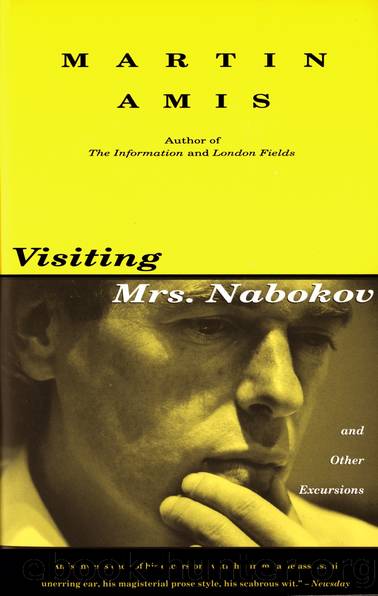Visiting Mrs. Nabokov by Martin Amis

Author:Martin Amis [Amis, Martin]
Language: eng
Format: epub
ISBN: 978-0-307-77779-9
Publisher: Knopf Doubleday Publishing Group
Published: 2011-01-26T00:00:00+00:00
I am delighted to be here, for all sorts of reasons: the sun, the sea breezes, this new wallet, the convulsive coughing fits that will punctuate my discourse. And I have further grounds for self-satisfaction. We are all familiar with our Herzogs and Humboldts and Hendersons, we all know our Augies and our Arturs; but nobody here has read the new one. Perhaps you have heard tell of it, you are acquainted with its lovely title: More Die of Heartbreak. But only I have read it. That is to say I have reread it; and I become more and more convinced that you cannot read writers like Saul Bellow; you can only reread them. I have read the new one â and you havenât. Not even Saul Bellow has read it. Oh, he has peered at the typescript, he has agonised over the proofs. He has written it. But he has not read it, as I have.
Once the first days of creation are over (once life has been assigned to various hunches and inklings), writing is decision-making. After the big decisions, the medium-sized decisions; then the little decisions, lots of little decisions, two or three hundred a page. When Bellow reads More Die of Heartbreak he isnât reading; he is squirming and smarting, feeling the pulls and shoves and aftershocks of a million decisions. For him the book is a million clues to a million skirmishes â scars, craters, bullet-holes. For me, it is a seamless fait accompli. And I am here to tell you â I am literally here to tell you â that it is as dense, as funny, as thought-crammed, as richly associational and as cruelly contemporary as anything he has written. Heâs over seventy. Whatâs the matter with him?
Here are further grounds for extreme complacence on my part: Bellow has been reading Philip Larkin. Now the narrator of More Die of Heartbreak grew up in Paris at the feet of heavy thinkers like Boris Souvarine and Alexandre Kojève who talked about geopolitics and Hegel and Man at the End of History and wrote books called things like Existenz (note the powerful z on the end, rather than the more modest ce). I grew up in Swansea, Wales, and Philip Larkin was a good deal around. He didnât talk about posthistorical man. He talked about the psychodrama of early baldness. Bellow quotes Larkin as follows: âIn everyone there sleeps a sense of life according to love.â âHe also says that people dream âof all they might have done had they been loved. Nothing cures thatâ.â And nothing â i.e. death â did cure that. Love was not a possibility for Larkin. Because to him death overarched love and rendered it derisory. He died in 1985; by Bellowâs age, incidentally, he had been dead for years. For him, death crowded love out. With Bellow, it seems to be the other way around. More die of heartbreak, says the title. Well, Larkin never had any heartbreak, not in that sense.
Download
This site does not store any files on its server. We only index and link to content provided by other sites. Please contact the content providers to delete copyright contents if any and email us, we'll remove relevant links or contents immediately.
| Books & Reading | Comparative Literature |
| Criticism & Theory | Genres & Styles |
| Movements & Periods | Reference |
| Regional & Cultural | Women Authors |
4 3 2 1: A Novel by Paul Auster(11178)
The handmaid's tale by Margaret Atwood(6959)
Giovanni's Room by James Baldwin(6044)
Big Magic: Creative Living Beyond Fear by Elizabeth Gilbert(4835)
Asking the Right Questions: A Guide to Critical Thinking by M. Neil Browne & Stuart M. Keeley(4703)
On Writing A Memoir of the Craft by Stephen King(4304)
Ego Is the Enemy by Ryan Holiday(4121)
Ken Follett - World without end by Ken Follett(4043)
The Body: A Guide for Occupants by Bill Bryson(3959)
Bluets by Maggie Nelson(3810)
Adulting by Kelly Williams Brown(3756)
Guilty Pleasures by Laurell K Hamilton(3679)
Eat That Frog! by Brian Tracy(3620)
White Noise - A Novel by Don DeLillo(3505)
The Poetry of Pablo Neruda by Pablo Neruda(3445)
Alive: The Story of the Andes Survivors by Piers Paul Read(3378)
The Book of Joy by Dalai Lama(3313)
The Bookshop by Penelope Fitzgerald(3303)
Fingerprints of the Gods by Graham Hancock(3287)
